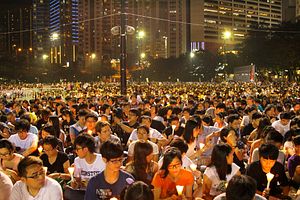Despite handing over her Tiananmen Mothers organization to another grieving family member, 77-year-old Ding Zilin has been under heavy surveillance since March, and film documentary-maker He Yang was detained and his house searched for attempting to interview her. Journalist Gao Yu (previously jailed twice for a total of seven years) has been reported missing on her way to a Tiananmen remembrance event. Ding Zilin’s successor, You Weijie, 61, has had her home phone cut off. This is the yearly Tiananmen anniversary crackdown, and those in Beijing know what to expect.
This year, as ever, it comes at a time of tension: terrorist attacks, arrests targeting the New Citizens Movement, and of course the obligatory web censorship campaign, “Cleaning the Web 2014.” While the dreaded anniversary of the crackdown itself isn’t until June 4, there are a number of anniversaries and events surrounding the protests that give Beijing an itchy propaganda finger, from the now infamous People’s Daily editorial to shouts of “Come out!” Almost all these dates pass in China without much comment.
Hu Yaobang’s death in April, however, was a bit of an exception. April 15 commemorated the death of Hu Yaobang who was, officially, a “long-tested and loyal Communist fighter, a great proletarian revolutionist and politician.” Unofficially and throughout the world, he is known as the man whose death sparked the protests that rocked Beijing before being tragically put down, ending the cause and hope of democratic political reform in China for decades to come.
Though in no hurry to engage, China’s state media in recent years has dipped tentative toes into the waters of recognizing the Tiananmen Massacre, but it does so with an air of superiority rather than remembrance. Weighing in on the anniversary of Hu’s death, the state-run and shamelessly pro-censorship newspaper Global Times said, “Some combined Hu with current controversy in society, while others vent their anger through warping history. These are for the pursuit of their own interests rather than in real memory of Hu.” The paper added, “It’s ridiculous that some on the Internet make use of his name to oppose the course to which Hu was devoted. It’s an insult to Hu’s glorious life. Those who oppose the leadership of the Party and who trumpet that China should copy the Western political model had better keep away from Hu’s name.”
As ever, there are the tiniest signs of hope that this year will be the year that Tiananmen is remembered properly, such as the fact that Hu Yangbao’s name could be freely searched online and posted on message boards. Zhao Ziyang is still way out of bounds, of course.
Tensions are also mounting from those troublesome Hongkongers. The Hong Kong Alliance in Support of Patriotic Democratic Movements of China opened the world’s first Tiananmen Square protest museum, though not without a few protests of their own to deal with from pro-Beijing supporters. Unlike the mainland, Hong Kong enjoys a large degree of free speech, free press and autonomy, something the pro-Beijing camp regularly uses to their advantage and something pro-democracy advocates on the mainland can not use at all.
Anyone looking for an honest, cogent look back at the protests in China’s ruthlessly controlled media — and some have been waiting now for 25 years — had just as well stay in bed on June 4, 2014.

































